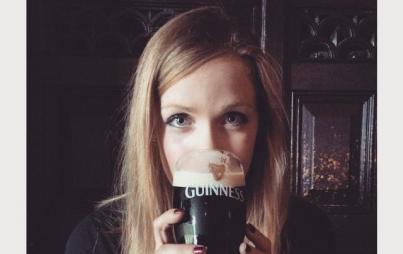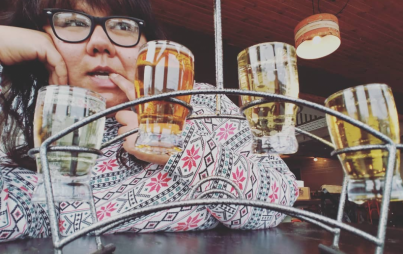
food is important.
...I decided to give Food a chance — a real shot — and I’ve been shocked at the ways it has changed my life.
Food and I, for a long time, have been in a complicated relationship.
I knew that I needed it, and it knew that I could only resist it for so long, and we’d eventually tango, leaving me feeling guilty and ashamed for ever going back to it in the first place. So then I’d stay away — ignoring all of its “hello from the other side” phone calls — for as long as I could.
We were on again, off again. And I always assumed that Food was the real problem, forever shoving it away with “It’s not me, it’s you.”
Until my therapist suggested that maybe — just maybe — I was controlling. That maybe I wasn’t deep into eating disorder territory anymore, but that I was still exercising a kind of power over my relationship with Food that was the root of all of our problems.
And so, I decided to give Food a chance — a real shot — and I’ve been shocked at the ways it has changed my life.
Here are just three of the ways that reconciling my relationship with Food has had very real, tangible effects on my body:
1. My Digestion Works Again
For such a long time, I would explain away why I couldn’t eat this or that with “It makes me feel sick.” And truth be told, I wasn’t lying. Those things — greasy fried food, heaps of dairy, rich desserts — really did make me feel sick. Mostly, it made me feel sick in the form of never leaving my fucking intestines.
I’d chalked this up to having had an eating disorder, never realizing that the ways in which I was still holding onto control of my diet were really the culprits.
For one thing, when you restrict your calorie intake (even to the extent that it’s “healthy,” as in, not what medical professionals would call “starvation mode”), your body wants to hold onto every modicum of food it can get, squeezing out every last bit of nutrition from that motherfucker. But further, it slows your metabolism way down — which generally translates into a lot of constipation.
What’s funny about that (oh, bodies, you are jokesters) is that it feels like constant bloating, which can be interpreted by a mind doused in diet culture as weight gain, affirming what you originally feared all along: that the foods in question would ruin you.
But the truth is that they’re not (I mean, OK, if eaten in moderation — obviously a diet of French fries and cheesecake isn’t going to be particularly great for your body). What ruins you is the restriction.
What I’ve (amazingly) learned is that if I eat what I want, when I want, and as much of it as I want (what my stomach wants, not my eyes, which are two separate measurements), my digestion regulates itself again.
Which means: no more going to bed feeling sick.
2. I Don’t Feel That Weird, Foggy Thing in My Head Anymore
I had gotten so used to this feeling, it was like I didn’t even realize it was there. It wasn’t until it had faded away that I wondered, “What ever happened to that weird sense that my brain was always dimmed, like it wasn’t quite all-the-way there?”
Oh yeah. I started eating.
Your body only has so much energy to give. And when you restrict your calories — which, remember, are units of energy — your body has to start borrowing energy from other sources. Sometimes this manifests in feeling really tired all the time because you expend your energy so quickly. Sometimes it looks like dizziness or passing out because oxygen isn’t circulating as freely. And sometimes, it’s just this slight feeling that your brain is cotton.
Most people, when they feel that sensation, recognize it as hunger. It may not be a traditional hunger pang, but it’s the same idea: It’s a signal from your body that it doesn’t have enough energy and that you’ve got to fuel it. And when you ignore this feeling for too long, it generally develops into a headache, resulting in feeling hangry.
But when you live day in and day out with this fogginess, you start to recognize it as the MO of your body. When it finally goes away, though, it feels like your mind has cleared and that you can focus again in a way you didn’t even realize you’d missed.
3. So. Much. Energy!
When I was in the depths of my eating disorder, I did a lot of exercise. Partly, this was a manifestation of the disorder in and of itself — anything that I ate, I felt that I had to burn off. I don’t even want to quote the number of hours per week that I was in a dance class — suffice it to say that it was a lot.
This is a common occurrence in people with restrictive eating disorders — not just because of an obsessive need to burn calories, but also because anorexic patients have been known to show a type of manic energy unseen in unaffected folks. It’s part of the brain’s survival instinct: “Fuck! We’re in a famine! Let me throw as much energy at you as I can so that you use it to find food!”
Eventually, though, all of that energy dwindled — until I could hardly exercise at all. I would, of course, a little bit, for health. But I would drag myself to the gym, find any excuse not to practice strength training at home, or stick to only passive styles of yoga that didn’t involve much movement.
Then I started eating like a healthy person again. And holy moly. Suddenly, all I wanted to do was move — to do something productive with this burst of vigor that I couldn’t shake.
I started going to yoga every single day — and not just sticking to yin and restorative practices, but incorporating vinyasa into my routine. And this time, it wasn’t out of a deep self-hatred, but because it brought me a profound sense of joy and satisfaction — something I never would have found had I not, unabashedly, picked the fork back up.
Nowadays, Food and I are on the up and up.
It’s taking time for me to trust it — to believe it when it says that it can only ever help me, never harm me — and my body is slowly getting used to the ways in which it’s changing.
But I have a feeling that Food and I are going to stay together for a long, long time. I don’t want to jinx our relationship, but I would even bet on forever.








